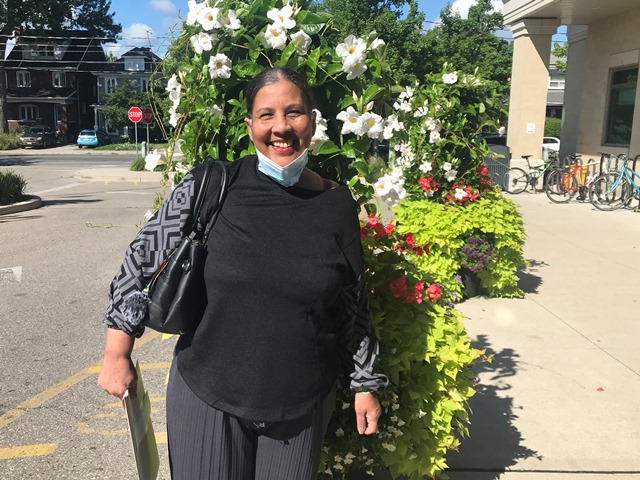By Michael Oreskovich
Patients recovering from lengthy battles with COVID-19 face many obstacles, even when free from the disease. In addition to being weakened from confinement in a bed for weeks or months, their breathing capacity is compromised, making it extremely challenging to regain strength and mobility. At Runnymede Healthcare Centre, respiratory therapists play a vital role in helping these patients – like Bibi – to achieve their rehabilitation goals.
Bibi overcame a 44-day battle with COVID-19 before being admitted to Runnymede for rehabilitation in July 2020. During her stay in acute care, Bibi suffered severe respiratory failure and was put on a ventilator in an intensive care unit. Extreme measures were needed to help her survive, including support from a machine that oxygenated her blood outside her body.
“I can’t remember much from what happened while I was in the ICU, except that I had tubes all around me, and I couldn’t talk, or even eat or drink,” Bibi said. “It was horrible. My family told me later that the doctors didn’t know if I would make it.”
But Bibi persevered, and like many recovered COVID-19 patients, her harrowing ordeal in acute care left her unable to safely return home. Her muscles were deconditioned due to her long hospital stay. The intense pressure that was on her heart and lungs left persistent trauma. Upon admission to Runnymede, Bibi was unable to get out of bed or walk without help.
“It’s common for patients who have gone through COVID-19 to face additional obstacles to recovery compared to other patients in our rehabilitation programs,” said Geeta Grewal, director of patient care at Runnymede. “Their capacity to breathe effectively is often much lower, which results in an elevated heart rate, shortness of breath and a tendency to become exhausted very easily. All of this makes it challenging for these patients to have a rapid recovery.”
Bibi entered Runnymede’s slow stream rehab program, which delivers low-intensity rehabilitation to patients who can’t cope with the pace of more active rehabilitation. The hospital’s physiotherapists (PTs) and occupational therapists (OTs) created a patient-centred plan to help restore Bibi’s independence so she could return home.
The treatment plan was challenging to execute because Bibi could not tolerate exertion without extreme fatigue. The hospital’s staff respiratory therapist (RT) was essential in ensuring her therapy would succeed.
“Our RT supports therapy by being at the patient’s side to monitor their heart rate and oxygen saturation while PTs and OTs provide therapy,” explained Grewal. “The RT administers supplemental oxygen as it’s needed so patients can get the maximum benefit from therapy sessions before they become too tired to safely continue.”
Runnymede’s RT also supported Bibi by educating her about breathing strategies that conserve oxygen. For example, Bibi learned how to break up activities so they are shorter and require less exertion. She was also taught how to perform diaphragmatic breathing, which helped strengthen her respiratory muscles.
A week and a half after Bibi’s admission to Runnymede, these strategies paid off: her endurance had improved to the point that she was able to complete her exercises without needing supplemental oxygen. Around the same time, she became less reliant on her walker and could walk independently for short distances.
Her therapy continued with weight training to further build strength, balance and flexibility. She learned to adapt to everyday tasks like washing, dressing, and taking stairs. On August 5, 2020 – three weeks after her admission to Runnymede, and 70 days after her initial hospitalization for COVID-19 – Bibi was discharged home.
Her recovery journey will continue while at home, where she will practice the breathing exercises taught to her by Runnymede’s RT. She is also committed to keep as active as she can in order to maintain and build on her strength.
“I’m the kind of person who always wants to get around and move and do things, so when this happened to me, I was so devastated at first,” Bibi said the day of her discharge. “I wanted to get back to my family and my job and the team here helped me get there – I’m so happy to be going back home again.”
Michael Oreskovich is a communications specialist at Runnymede Healthcare Centre.




